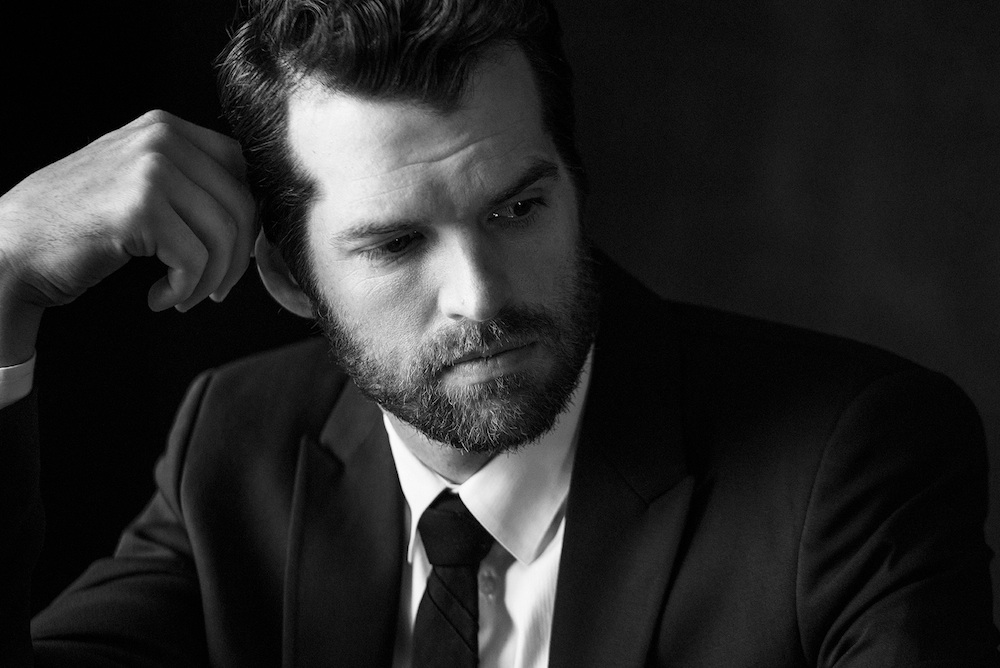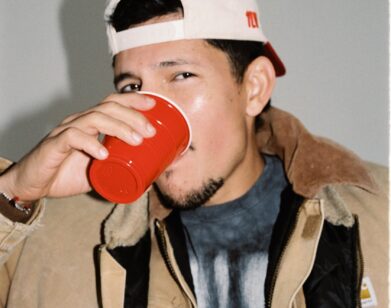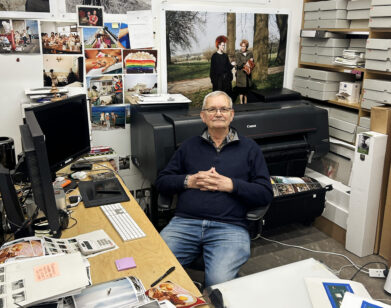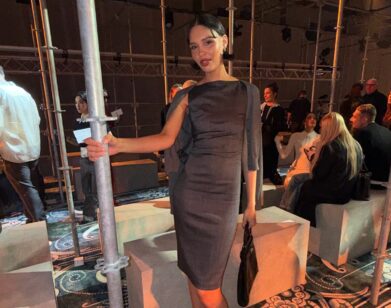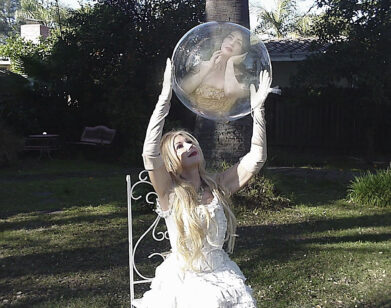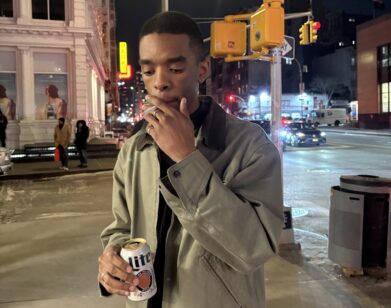Jonah’s Arc
TIMOTHY SIMONS IN LOS ANGELES, MAY 2015. PHOTOS: BRIAN HIGBEE. STYLING: LEAH HENKEN. GROOMING: ANNA BERNABE FOR EXCLUSIVE ARTISTS MANAGEMENT USING ARMANI BEAUTY.
“Jonad,” “Jolly Green Jizz Face,” “Long Tall Sally,” “The world’s biggest single-cell organism,” “Frankenstein’s monster if his monster was made entirely of dead dicks”—the creative insults hurled at Jonah Ryan, Timothy Simons’ character on Veep, inspire YouTube supercuts and scores of listicles. As the inept, power-hungry White House liaison currently relegated to the Vice President’s office, Simons is endearingly vile. It’s tempting, at times, to feel sorry for Jonah—when he loses his first job at the White House or is casually fondled by a co-worker (Patton Oswalt)—but the feeling never lasts long. Jonah gives as good as he gets. “Any empathy that you have for Jonah, he will erase,” Simons explains. “He’ll make you pay with his own behavior. I always think that’s really funny.”
A native Mainer, Simons began his career in regional theater. In the three years since Veep premiered, however, the actor has branched out into film with roles in Paul Thomas Anderson’s Inherent Vice, Draft Day, and The Interview. Last month, Simons wrapped Michelle Darnell with Melissa McCarthy and Peter Dinklage. “I play Dinklage’s idiot brother,” Simons says. “Melissa’s husband Ben Falcone is directing, and it was an absolutely joyous process. They just love jokes; they love chasing jokes, they love chasing a funny idea. Nothing is out of bounds.”
EMMA BROWN: When you first auditioned for Jonah, what was the character breakdown?
TIMOTHY SIMONS: [Veep creator] Armando Iannucci and [writer] Simon [Blackwell] have talked about this before. The character breakdown was for a short, heavy-set, bearded guy, whose voice would go high-pitched when he got angry. So pretty much the opposite of me. There was actually something quite freeing about that. Knowing that I will never fit into that description, I was able to do whatever I thought would work best rather than trying to shoehorn myself into the breakdown.
BROWN: Did Jonah talk in the same way as he does in the show or did that change as well?
SIMONS: His smug self-satisfaction was there from the beginning. One thing that’s been added in as time has gone on is his internet and hip-hop slang. The internet slang I think was born out of trying to find, outside of being a liaison, what were the tasks that Jonah would reasonably be given. Nothing too important, but his bosses have to give him something to do. With the hip-hop, the bravado—that attitude of “I’m the greatest of all time”—fit in with Jonah’s attitude. I think Jonah views himself as a mogul on the way up. I think he’s told himself before, “If I ever met Jay Z, we would really get along because Jay Z would recognize that I’m on my way to greatness.” But that general smug douchiness was there from the beginning.
BROWN: Does getting a breakdown like that—a physical description that you clearly don’t fit—ever put you off auditioning for a role?
SIMONS: I don’t worry about it anymore, because it doesn’t matter. Unless you’re playing a historical figure, a writer or director can change their minds. And sometimes your job is to make them change their minds—to make them believe that you’re the one that can do it. It doesn’t always work, but you can’t worry about it. Hopefully they’ll change their minds and if they don’t, then it wasn’t yours to get.
BROWN: You’re from Maine. How did you get to Chicago?
SIMONS: I was interning at a children’s theater group in Kentucky—that was my first job out of college. I had jumped around a couple of regional theaters, and I was about to go back to Maine to work at a summer Shakespeare theater there. I didn’t want to just jump around the country from gig to gig. I really wanted to go to a city and get involved in a theater scene and a theater community. I had some friends who had moved out to Chicago and had said really good things about it and about the work. I didn’t care at that time about making money. I crashed on my friend’s couch for about a month before I found a ridiculously small studio apartment. Outside of this one person who let me crash on their couch, I didn’t know anybody in town. I moved there just as winter was starting and I spent about six months going certifiably fucking insane in this studio apartment. It all got better when the summer came around.
BROWN: Did you study theater in college?
SIMONS: I did. I started out with the intention of studying physics. I was a terrible high school student outside of the fact that I did well in physics, but there’s a big difference between being good at physics and being a physicist, so I jettisoned that very quickly. I found myself not making a lot of friends my first year. I was having trouble adjusting and not really meeting anybody, so I just decided to audition for some 10-minute plays even though I hadn’t really been involved in that sort of thing in high school. By the end of my first year, I had switched majors and that was what I was going to do.
BROWN: Do you come from an artistic family?
SIMONS: I do. My dad’s a photographer and my sister is a writer and a poet. My little brother is a mandolin player—he’s a bluegrass musician. It’s always been a part of the family.
BROWN: What made you move to film and television in L.A.?
SIMONS: I had grown up working in a video store, and I’d grown up more with film than I had with theater, so I kind of felt a natural call. When I was 21 and moving to Chicago and saying, “I don’t care if I get paid or not,” eventually you turn 27 and you’re like, “Fuck me, it would be really nice to make money doing this.” So there were some financial choices. Also I’m a contrarian fucker to the very definition of it. Chicago hates L.A., and there’s that part of me that’s like, “You hate L.A., well fuck you! I’m moving to L.A.”
BROWN: What was your first professional audition in L.A.?
SIMONS: I’d moved to L.A. sight unseen, and I was trying to figure out the town—I still don’t know that I have—but I was trying to get a sense of how things worked. I remember going to an agent audition. I showed up and there were probably 90 people in this waiting room. You would go in 10 at a time, line up, step forward, do a one-minute monologue, and then you would step off to the side. I saw this process and was like, “This is a fucking joke.” I ended up just leaving.
BROWN: How did you come to audition for Veep? Did you have your agent at UTA then?
SIMONS: No, I didn’t start working with UTA until after I’d been cast on the show. My friend Peter works for [Veep‘s casting director] Allison Jones. I was cast in a commercial that he thought was funny, so he showed it to her. She called me in for a really small part in a remake of Fright Night, which was a movie that I loved when I was a kid. I did such an awful job—I went into a really fantastic actor’s spinout. The audition was at 11, and by 1:30, I had convinced myself that I had done such a bad job I was going to have to leave town. It was over. I had completely burned any chance or opportunity I would have ever had with this audition. That’s how I met Allison, completely fucking up this audition. Then I went in a few more times for her and maybe the fifth or sixth time was auditioning for this show. It should have never worked out, but somehow it did.
BROWN: There are some very creative insults directed at Jonah on the show. When people recognize you on the street, do they every come up to you and say a ridiculous Jonah insult?
SIMONS: A lot of times I get the quick in and out of “Jonad.” Although I’m realizing, and maybe this will be a good venue for me to say this—it hasn’t happened yet—but with the new plotline of the sexual assault from Teddy, I think it really needs to be stated very clearly that that is not acceptable day to day. It’s fine, you can say Jonad, I totally get that, but I realize somebody might find it funny to walk up and grab me. That makes me a little bit nervous. It would be preferable if everybody just kept it to the insults.
BROWN: I was reading a post advertising your appearance on a talk show, and one of the comments was, “I hope they ask him what it’s like to have Patton Oswalt grab your balls.”
SIMONS: It’s a really odd thing. I don’t know how people who have to do that regularly—people on Game of Thrones who have to have movie sex—do it. It’s weird to have to look at another co-worker and have a silent discussion—any discussion—about how you are going to touch their genitals or allow them to touch your genitals.
BROWN: It’s really easy to laugh at Jonah, but there are things that happen to him that no one deserves. How do you find empathy for him?
SIMONS: That goes back to all that theater training—the stuff that you role your eyes at when you start talking about it too much. The idea that it’s all based in something in his upbringing, or something that he was told once that stuck with him—like someone telling him, “No one’s going to believe in you as much as you believe in yourself.” He got some advice one time and he just took it the wrong way. “Believe in yourself”—that makes sense. You should believe in yourself—you should believe that you’re capable of great things—but you would hope that somebody would have some sort of self-awareness. That’s how I find empathy for him. He’s just a guy trying to make his way in the profession that he’s chosen. He has really fucked up and idiotic ways of going about it.
BROWN: I wanted to ask you about Inherent Vice as well, what was that like? It must have been quite exciting.
SIMONS: Especially being a movie person and having so much—I don’t even know if respect is a big enough word for how I feel about Paul Thomas Anderson, but just to be on set with him and watch him work, and be in the same room as him as he’s building a shot with his DP is incredible. I think I was on set five or six days. I would’ve been a guy that just waved in the background, but I actually got to say words.
SEASON FOUR OF VEEP IS CURRENTLY AIRING SUNDAY NIGHTS ON HBO.

